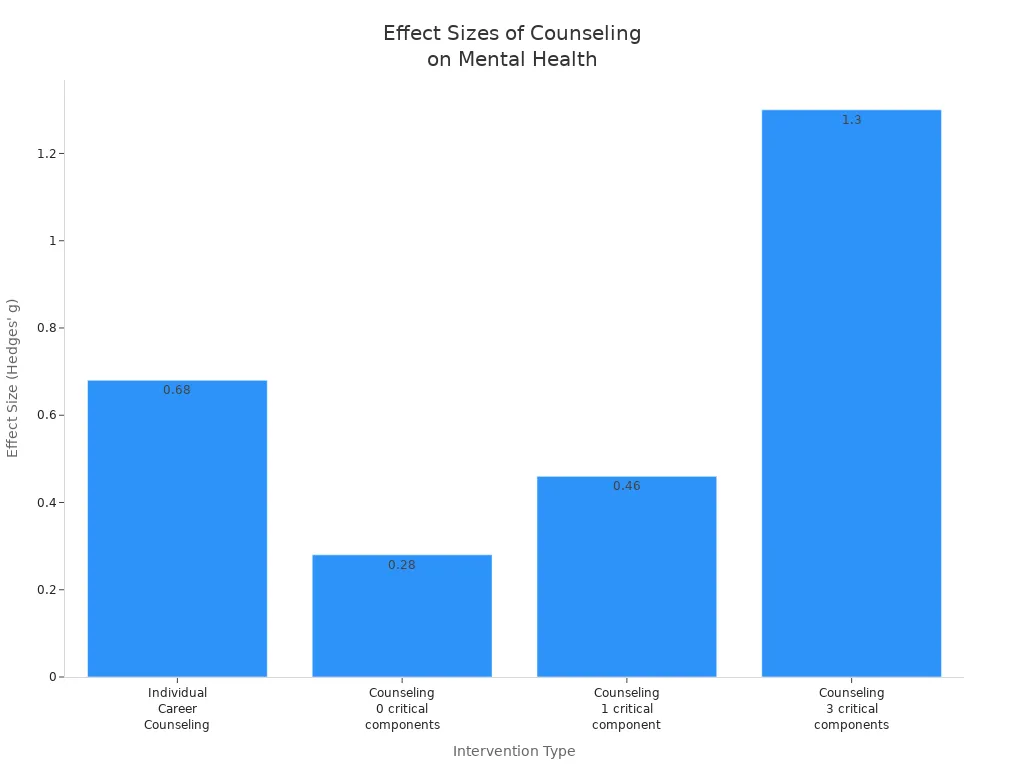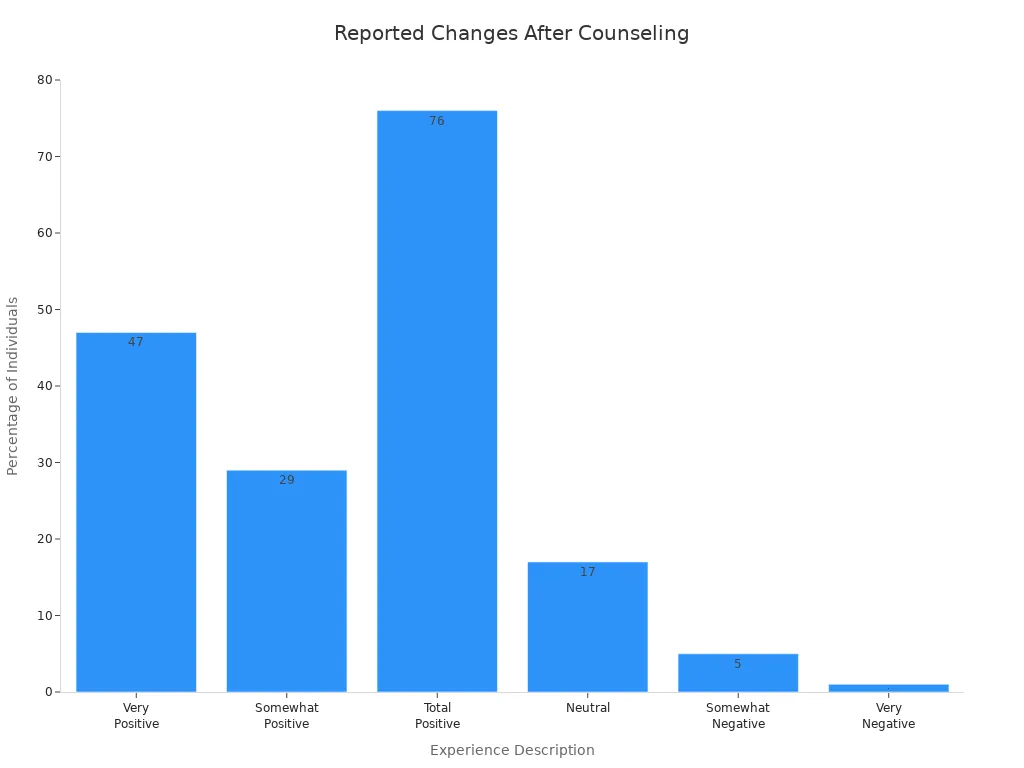Top Reasons to Seek Professional Counseling for Mental Health

Your mental health shapes your daily life, relationships, and ability to thrive. Choosing professional counseling opens doors to expert guidance, confidential support, and true personal growth. Studies show that counseling with all critical components can make a powerful difference, offering large improvements in mental health outcomes compared to no intervention.

Unlike informal support, you get proven strategies and a safe space to heal. Professional Counseling: When and Why to Seek Help empowers you to take control and prioritize your well-being.
Key Takeaways
Professional counseling offers expert help and proven strategies to improve your mental health and build strong coping skills.
Counseling provides a safe, confidential space where you can explore your feelings and grow with trusted support.
Early counseling helps prevent problems from getting worse and supports you through life changes like loss, new jobs, or relationships.
Professional counselors use special techniques and training that friends and family cannot provide, giving you focused and effective care.
Seeking counseling is a brave step that leads to personal growth, better self-awareness, and a healthier, happier life.
Why It Matters
Addressing Emotional Challenges
You face many emotional challenges in life. Professional counseling gives you a safe place to talk about your feelings and struggles. Counselors help you work through tough times and guide you toward healing.
Some common emotional challenges include:
Resistance or lack of engagement in relationships
Struggles with setting healthy boundaries
Facing ethical dilemmas or confidentiality concerns
Handling crisis situations, such as thoughts of self-harm
Building emotional resilience
When you work with a counselor, you learn to manage these challenges with support and understanding. You do not have to face them alone.
Building Coping Skills
Counseling helps you build strong coping skills for stress and anxiety. Techniques like Cognitive-Affective Stress Management Training (CASMT) teach you how to handle tough emotions. You practice relaxation and learn to change negative thoughts.
Research shows that people who use these skills feel less stressed and more in control. For example, after practicing coping skills, people report much lower stress levels. You gain tools that help you stay calm and focused, even when life feels overwhelming.
Improving Self-Awareness
Counseling also helps you understand yourself better. You explore your emotions, experiences, and behaviors in a safe space.
You learn what triggers your stress.
You discover patterns in your relationships.
You become more mindful and reflective.
This self-awareness helps you make better choices and build stronger connections with others. When you know yourself, you can grow and thrive. Counseling gives you the insight and confidence to move forward with your life.
Key Benefits
Expert Guidance
You deserve help from someone who truly understands mental health. Professional counselors have advanced degrees and thousands of hours of supervised experience. They pass tough exams and follow strict ethical rules.
Most counselors hold a master’s or doctoral degree in counseling.
They complete at least 3,000 hours of supervised clinical work.
They must pass national exams and keep learning every year.
Counselors use proven therapies like Cognitive Behavioral Therapy (CBT) and Dialectical Behavioral Therapy (DBT). These methods help you manage anxiety, depression, and stress. You get advice that is based on science, not guesswork.
With expert guidance, you learn new skills and gain confidence to handle life’s challenges.
Confidential Support
You need a safe place to talk about your feelings. Counseling gives you that privacy. Laws protect your information. Counselors cannot share what you say unless there is a serious risk of harm or a legal reason.
Your records stay secure and private.
You decide who can see your information.
Even after you finish counseling, your privacy remains protected.
Confidential support means you can speak freely without fear of judgment or gossip. You control your story.
Personal Growth
Counseling helps you grow in ways you may not expect. You set clear goals with your counselor and track your progress together.
You learn to manage emotions and build resilience.
You discover your strengths and improve self-esteem.
You practice better communication and problem-solving.
Research shows that counseling leads to real, measurable changes. You become more self-aware and motivated. You learn to face challenges with courage and hope.
Personal growth is not just possible—it is likely when you invest in yourself through counseling.
Professional Counseling: When and Why to Seek Help

Signs You Need Help
You may wonder when to reach out for support. Recognizing the signs is the first step. If you notice changes in your mood, behavior, or physical health that last for two weeks or more, it is time to consider Professional Counseling: When and Why to Seek Help. Here are some common signs:
Persistent sadness or hopelessness that affects your daily life
Anxiety or worry that feels overwhelming
Changes in sleep patterns, such as trouble sleeping or sleeping too much
Loss of interest in activities you once enjoyed
Difficulty focusing or making decisions
Changes in appetite or weight
Withdrawing from friends and family
Irritability or sudden anger outbursts
Physical symptoms like headaches or stomachaches with no clear cause
Thoughts of self-harm or suicide (seek immediate help)
If you see these signs in yourself or someone you care about, do not wait. Professional Counseling: When and Why to Seek Help can make a real difference.
Early Intervention
You do not have to wait until things get worse. Early action leads to better results. When you choose Professional Counseling: When and Why to Seek Help early, you give yourself the best chance for recovery. Acting quickly can:
Prevent problems from becoming more serious
Reduce the risk of long-term mental health issues
Improve your ability to function at school, work, or home
Lower stress for you and your family
Save time and money by avoiding bigger problems later
Delaying support can make symptoms harder to treat. Early intervention helps you regain control and build healthy habits. You deserve to feel better, and Professional Counseling: When and Why to Seek Help gives you the tools to succeed.
Taking action early is a sign of strength, not weakness. You protect your future by seeking help now.
Managing Life Transitions
Life brings many changes. Some are exciting, while others feel overwhelming. You might move to a new city, start a new school, or change jobs. You could face divorce, become a parent, or lose someone you love. Even positive events like marriage or graduation can cause stress.
Professional Counseling: When and Why to Seek Help supports you through these transitions. You learn to cope with new roles, manage stress, and find healthy ways to adjust. Here are some common life changes where counseling can help:
Moving or starting over in a new place
Beginning or ending a relationship
Becoming a parent or caring for a family member
Experiencing the loss of a loved one
Facing a serious illness or diagnosis
Starting a new job or leaving an old one
You do not have to handle big changes alone. Professional Counseling: When and Why to Seek Help gives you guidance and support every step of the way.
Choosing Professional Counseling: When and Why to Seek Help is a powerful step toward a healthier, happier life. You take control, build resilience, and create a brighter future for yourself.
Counseling vs. Informal Support
Unique Advantages
You might wonder why you should choose professional counseling when you already have friends and family who care about you. Professional counseling offers unique advantages that informal support cannot match.
Here is a table that shows the key differences:
Aspect | Professional Counseling | Informal Support (Friends/Family) |
|---|---|---|
Availability | Scheduled sessions | Available anytime |
Emotional Involvement | Empathy with boundaries | Deep emotional attachment |
Communication Style | Focused and therapeutic | Casual and spontaneous |
Reciprocity | One-way support | Mutual give-and-take |
Professional Skills | Trained, uses proven techniques | Relies on personal experience |
Confidentiality | Legally protected | Not guaranteed |
Influence | High, based on expertise | Lower, based on relationship |
Professional counselors use special techniques that friends and family cannot provide. Some of these include:
The Empty Chair technique, where you talk to an imagined person to express feelings.
Role-play, which helps you practice new ways to handle tough situations.
Motivational interviewing, which helps you find your own reasons to change.
Expressive arts therapy, where you use art or music to share emotions.
Unconditional positive regard, where your counselor accepts you without judgment.
With these tools, you gain deeper insight and real strategies for growth. You get support that is focused on your needs and goals.
Limitations of Friends and Family
Friends and family want to help, but they face real limits. They may not always understand what you are going through. Sometimes, they judge or misunderstand your feelings. Privacy can be a problem, and you might worry about gossip or hurt feelings.
Friends and family often expect you to support them in return, which can add stress.
They do not have training in mental health, so their advice may not fit your situation.
Stigma and negative attitudes about mental health can make it hard to open up.
Support from loved ones can sometimes feel unhelpful or even harmful, especially if they do not know how to respond.
Research shows that informal support works best for mild problems. For serious issues, you need more than good intentions. Professional counseling gives you the structure, privacy, and expertise you deserve. When you combine both types of support, you give yourself the best chance for healing and growth.
Overcoming Stigma

Addressing Misconceptions
Many people hesitate to seek counseling because of common myths. You might think therapy is only for people with severe problems or that it means you are weak. These ideas are not true. Counseling helps people from all walks of life. It supports you in building coping skills, understanding your emotions, and growing as a person.
Some misconceptions come from cultural beliefs or media portrayals. For example:
Some cultures believe you should solve problems alone or only talk to family.
Media often shows therapy as a last resort or makes it look strange.
People sometimes think counselors only listen and do not help.
Others believe therapy is not effective or is only for certain groups.
You deserve support that fits your needs. Therapy is for anyone who wants to feel better, not just for those in crisis.
Remember: Seeking help is a sign of strength, not weakness.
Privacy and Confidentiality
You may worry about privacy when thinking about counseling. Confidentiality is a core part of therapy. Your counselor keeps your information private. They cannot share what you say unless there is a serious risk of harm or a legal reason. This trust helps you feel safe to open up.
Privacy policies protect you from stigma. When you know your story stays between you and your counselor, you can speak honestly. This safe space builds trust and helps you get the most from counseling.
Trust and privacy are the foundation of effective therapy. You control your story.
Taking the First Step
Stigma can make it hard to reach out. You might fear being judged or worry about what others will think. Many people feel this way, but you are not alone. Taking the first step is brave.
Here are ways to make it easier:
Remind yourself that mental health matters as much as physical health.
Talk to someone you trust about your feelings.
Learn about the benefits of counseling, like better self-awareness and resilience.
Try a single session to see how it feels.
Know that asking for help shows courage and self-respect.
You have the power to break the stigma. By seeking support, you inspire others to do the same. Your well-being comes first.
You deserve to feel your best. Professional counseling gives you expert support, privacy, and real tools for growth. Most people—76%—report positive changes after seeking help.

Long-term counseling helps you:
Maintain mental health for life
Reaching out shows courage. Prioritize your mental health and take the first step toward a brighter future.
FAQ
What if I feel nervous about starting counseling?
Feeling nervous is normal. You take a brave step by reaching out. Counselors understand your worries. They help you feel safe and respected. You set the pace. You control what you share. Your comfort matters most.
How do I know if counseling is working for me?
You notice small changes first. You feel less stressed. You handle problems better. You start to understand your feelings. Your counselor checks your progress with you. Celebrate every step forward!
Can I stop counseling whenever I want?
Yes, you decide when to stop. You control your journey. You can pause or end sessions at any time. Your counselor supports your choices. You always have the final say.
Will anyone know I am seeing a counselor?
Your privacy stays protected. Counselors keep your information secret. No one will know unless you choose to share. Laws protect your confidentiality. You can trust your counselor to respect your privacy.
What if I cannot afford counseling?
Many counselors offer sliding scale fees.
Some schools and workplaces provide free sessions.
Community clinics help with costs.
Ask about payment options.
You deserve support, no matter your budget.
See Also
Recognizing Signs And Managing Treatment Of Adrenocortical Adenoma
Identifying Symptoms And Treatment Options For Choroid Plexus Carcinoma
A Comprehensive Guide To Symptoms And Treatment Of Conjunctival Melanoma
Exploring The Causes And Symptoms Associated With Anal Cancer

